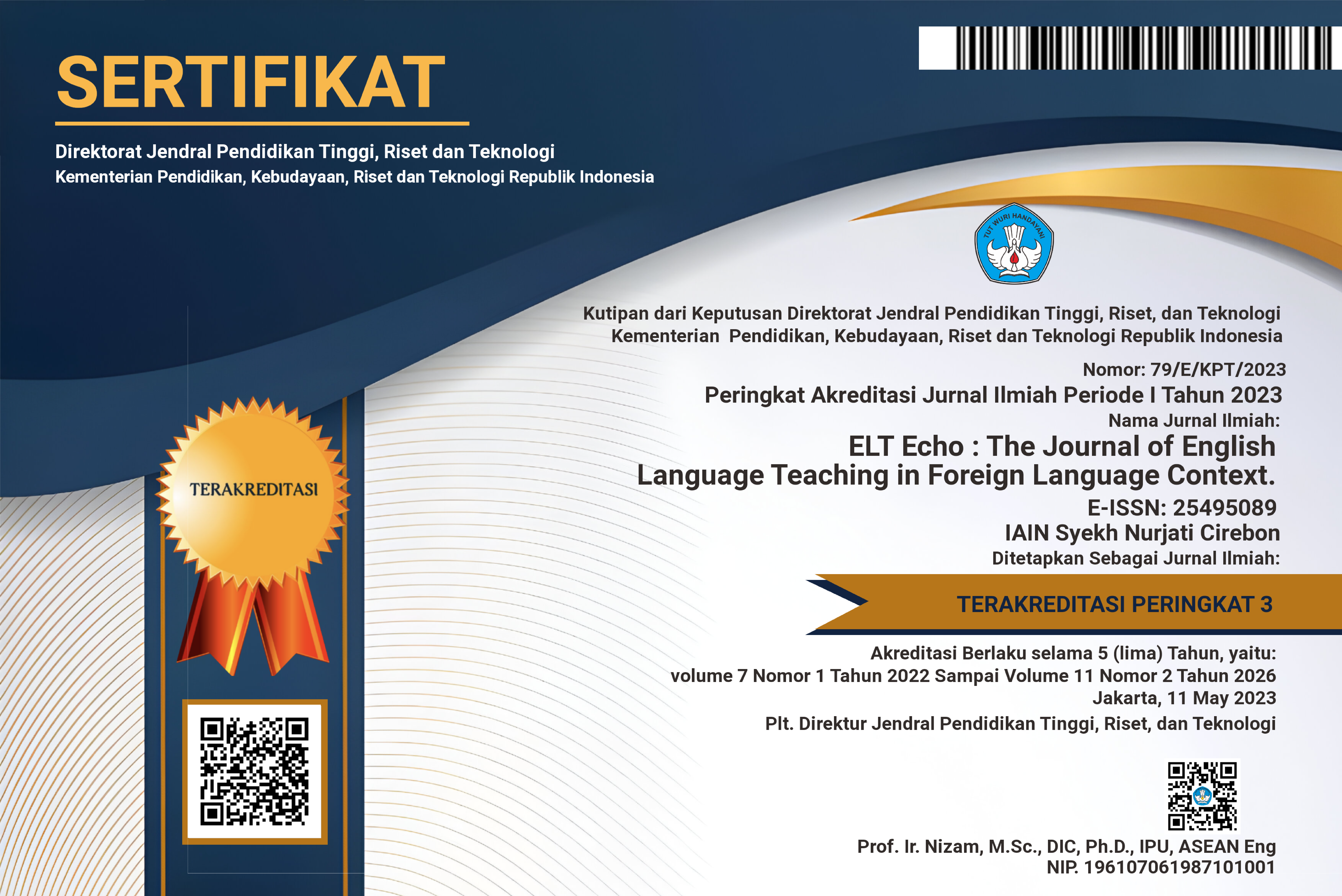LEARNERS’ AGENCY IN FOCUS: INTRODUCING THE 21ST CENTURY ACADEMIC WRITING PEDAGOGY IN INDONESIA
(1) English Language Teacher Education (ELTE), Faculty of Education and Teacher Training IAIN Syekh Nurjati Cirebon
(*) Corresponding Author
Abstract
The notion of transformative learning has been echoed by the Indonesian government in the National Standard of Education (2020, 2015). A shift from the teacher-centric into the student-centric pedagogy is a prerequisite to trigger the learning transformation. However, in the field of English language teaching (ELT) in particular, there remains a firm reliance on the dogma of modern linguistics that positions linguistic description and grammatical mastery as the key for meaning-making mechanism. Consequently, such monolithic ELT pedagogy expects a steady compliance from the students in relation to learning, and thus learners’ creative agency was removed. This paper is a reflection on how the learning of academic writing unit was approached differently by using a multisensorial-multicognitive pedagogy as informed by neuroscience, thus breaking away from linguistics as the sole informing theory for learning language. This new academic writing pedagogy embraces language learning as a complex system, thus incorporating other bio-psychological components in learning such as rhythm, intonation, movement, emotion, and aesthetics. This paper highlights how these components were used creatively in the three innovative learning tools – Verbotonal Approach, Reading for Emotions, and Aesthetics – to support agentive learning practice in academic writing course. This new pedagogy was developed in a doctoral research project in an Australian university and was proven effective to help students transform their learning practices.
Keywords
Full Text:
PDFReferences
Aunurrahman, A., Hamied, F., & Emilia, E. (2017). Exploring the tertiary EFL students’ academic writing competencies. Indonesian Journal of Applied Linguistics, 7(1), 72-79. doi:http://dx.doi.org/10.17509/ijal.v7i1.6860
Aunurrahman, Hamied, F. A., & Emilia, E. (2016). Facilitating character building through an academic writing practice. Arab World English Journal, 7(3), 146–160.
Alwasilah, A. C. (2013). Policy on foreign language education in Indonesia. International Journal of Education, 7(1), 1-19.
Alwasilah, A. C. (2012). Pokoknya Rekayasa Literasi. BandungL PT Kiblat Utama.
Alwasilah, A. C. (2002, 02 May). Critical thinking crucial to global success, The Jakarta Post. Retrieved from lgtv.thejakartapost.com/index.php/read/news/89229.
Baines, L. (2008). A teacher’s guide to multisensory learning: Improving literacy by engaging the senses. Virginia: Association for Supervision and Curriculum Development (ASCD).
Basthomi, Y. (2016). Mentoring penulisan karya ilmiah. Jurnal Ilmu Pendidikan, 21, 115-125.
Basthomi, Y. (2009). Examining spaces in doctoral prospectuses. TEFLIN Journal, 20 (2), 140-158.
Bumela, L. (2020). Designing 21st century language learning scenario in Indonesia: A Perspective from computer-assisted language learning. Indonesian Journal of Arabic Studies, 2(1). DOI : 10.24235/ijas.v2i1.6106
Damasio, A. & Immordino-Yang, H. (2007). We feel, therefore we learn: The relevance of affective and social neuroscience to education, International Mind, Brain, and Education Society, 1(1), 3-10. doi:10.1111/j.1751-228X.2007.00004.x.
Davis, B., Sumara, D., and Luce-Kapler, R. (2008). Engaging minds: Changing teaching in complex times. London: Routledge.
Eagleman, D. (2011). Incognito: The secret lives of the brain. New York: Pantheon.
Elder, L., & Paul, R. (2010, October). Universal intellectual standards. Retrieved December 6, 2014, from http://www.criticalthinking.org/pages/universal -intellectual-standards/527
Emilia, E., & Hamied, F. A. (2015). Systemic functional linguistic genre pedagogy (SFL GP) in a tertiary EFL writing context in Indonesia. TEFLIN Journal, 26(2), 155-182. https://doi.org/10.15639/teflinjournal.v26i2/15 5-182
Freadman, A. (1994). Models of genre for language teaching. The 1994 Sonia Marks Memorial Lecture. [Sydney:] University of Sydney.
Freadman, A. (2004). When the king and queen of England came to town: Popular entertainment, everyday life, and the teaching of “cultureâ€. Inaugural lecture in the University of Melbourne. Retrieved June 10, 2011 from: http://languages.unimelb.edu.au/about/staff/profiles/freadmanlecture.html.
Guberina, P. (1972). Restricted bands of frequencies in auditory rehabilitation of deaf. Zagreb: Institute of Phonetics, Faculty of Arts, University of Zagreb.
Halliday, M., & Matthiessen, C. M. (2004). An Introduction to Functional Grammar. London: Hodder Education.
He, B., & Sangarun, P. (2015). Implementing autonomy: a model for improving pronunciation in Chinese EFL university students. Rangsit Journal of Arts and Sciences, 5(1), pp. 1–12.
He, B., Sangarun, P. & Lian, A.-P. (2015). Improving the English pronunciation of Chinese EFL university students through the integration of CALL and verbotonalism. In J. Colpaert, A. Aerts, M. Oberhofer, & M. Gutiérez-Colón Plana (Eds.). Seventeenth International CALL Research Conference: Task Design and CALL (pp. 276–285). University of Antwerp. Retrieved from http://wwwa.fundacio.urv.cat/congressos/public/usr_docs/call_2015_conference_proceedings.pdf.
Henry, A. and Roseberry, R.L. (1998). An evaluation of a genre-based approach to the Teaching of EAP/ESP Writing. Teachers of English to Speakers of Other Languages, Inc. (TESOL), 32(1). DOI: 10.2307/3587913.
Indonesian Government. (2014). The Minister of Education and Culture Decree No. 49 Year 2014 on National Higher Education Standards Jakarta: The Ministry of Education and Culture of the Republic of Indonesia.
Indonesian Government. (2012). Publikasi Karya Ilmiah. Jakarta: The Ministry of Education and Culture of the Republic of Indonesia.
Jubhari, R.S. (2003). Cultural influences on the rhetorical structure of undergraduate thesis introductions in Bahasa Indonesia and English. PhD Thesis. Monash University, Melbourne, Australia.
Klein, P. D. (1999). Reopening inquiry into cognitive processes in writing to learn. Educational Psychology Review, 11(3), 203-270.
Lian, A.-P. (2000). Keynote address: From first principles: Constructing language learning and
teaching environments. In M.-S. Lin (Ed.), Selected papers from the ninth international symposium on English teaching (pp. 49–62). Taipei: Crane Publishing. Retrieved 3 July 2017 from
http://www.andrewlian.com/andrewlian/prowww/first_principles/index.html.
Lian, A. B. (2006). A dialogic model of inquiry in second language teaching: Toward the concept of a critical approach to pedagogic research (Doctoral thesis), The University of Queensland, Australia.
Lian, A.B., Bordnarchuk, A., Lian, A. P. & Napiza, C. (2016). Academic writing as aesthetics applied: Creative Use of Technology to Support Multisensory Learning. In: Lian, A., Kell, P., Black, P. & Koo Yew Lie, Challenges in Global Learning, CPS, London.
Lian, A.B. (2017). Reading for emotion with ICT tools. In Chen, W. et al. (Eds.) (2017). Proceedings of the 25th International Conference on Computers in Education. (Internationally refereed proceedings) New Zealand: Asia-Pacific Society for Computers in Education.
Lian, A.-P., & Sussex, R. D. (2018). (in press). Toward a critical epistemology for learning languages and cultures in 21st century Asia. In Andy Curtis and Roland Sussex (Eds), Intercultural communication in Asia: Education, language and values. Proceedings of the Third Macao International Forum, 15-19 December 2014, Macao Polytechnic Institute, Macao. Berlin and London: Springer Verlag.
Lian, A.-P. (1980). Intonation patterns of French (teacher’s book). Melbourne, Auckland: River Seine Publications Pty Ltd.
Luke, A. (2000). Critical literacy in Australia. Journal of Adolescent and Adult Literacy, 43, pp. 1-19. Retrieved May 22, 2017 from: http://paddle.usp.ac.fj/collect/paddle/index/assoc/pride024.dir/doc.pdf.
Martin, J. (2007). Construing knowledge: a functional linguistic perspective. In Frances Christie and J.R. Martin (Eds.), Language, Knowledge and Pedagogy: Functional Linguistic and Sociological Perspectives, (pp. 34-64). London: Continuum.
Ramachandran, V. & Hirstein, W. (1999). The science of art: A neurological theory of aesthetic experience. Journal of Consciousness Studies, 6(6-7), 15-51.
Ramachandran, V. S. (1996). The Evolutionary Biology of Self-Deception, Laughter, Dreaming and Depression: Some Clues from Anosognosia. Medical Hypotheses, 47, 347-362
Schwartz, M. & Kotz, S. (2015). The timing of regular sequences: Production, perception, and covariation. Journal of Cognitive Neuroscience, 27, 1697-1707.
Yang, Y. (2017). Improving the English speaking and phonological working memory skills of Chinese primary EFL learners: A verbotonal-based approach. PhD Thesis. Suranaree University of Technology.
Yang, Y., Wannaruk, A. & Lian, A.-P. (2017). (Forthcoming) Improving the English-speaking skills of Chinese primary E
DOI: 10.24235/eltecho.v6i2.9567
Article Metrics
Abstract view : 87 timesPDF - 14 times
Refbacks
- There are currently no refbacks.
Â
This Journal is indexed by:
Â

This work is licensed under a Creative Commons Attribution 4.0 International License.










